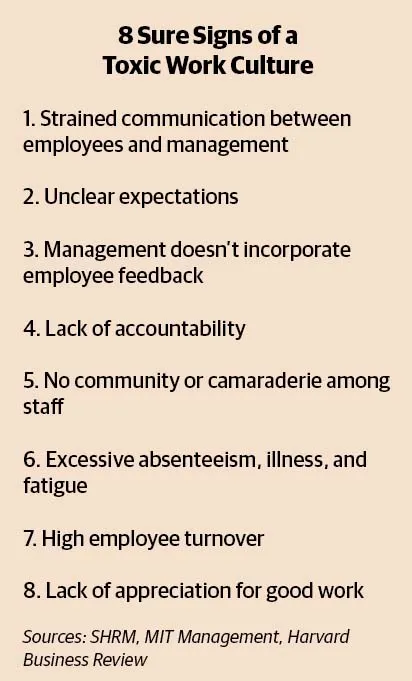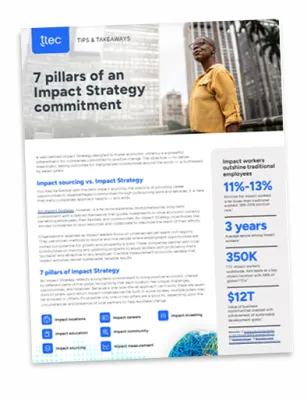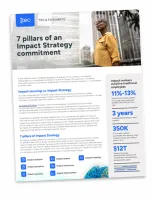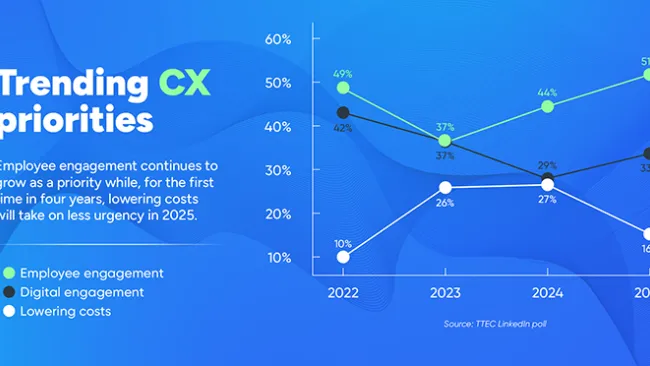Where is the line between performance feedback and bullying? When does hustle culture become abusive and dangerous? Toxic company cultures are all too common in modern businesses. One in five Americans have left a job in the past five years due to bad company culture, according to a recent SHRM report on workplace culture. The cost of that turnover is an estimated $223 billion.
Addressing toxic company cultures—typically defined as a culture where employee trust, morale, and psychological safety have plummeted— is especially important in today’s rapidly changing workforce and workplace. Employee demands for organizations to be more inclusive and diverse are growing and technological advances are changing the ways people work and collaborate with each other.
Steve Koepp, cofounder of From Day One, a conference series and media outlet that’s focused on corporate values, and a former executive editor for Time and Fortune magazine, has spent a lot of time studying the relationships between employers and their employees as an entrepreneur and journalist. Koepp shared insights on how to avoid a toxic company culture and still be customer obsessed.
What lessons have you learned about balancing business growth and positive company culture?

Steve Koepp: I have learned valuable lessons in the damage of both growing too slow and too fast. At the early stages, growth was frightening, and as I developed our teams, the leaders started to lose vision without expansion. They stopped seeing the potential for growth within my company. This either caused an A-player to reduce to a B-level or to leave my company for another opportunity.
The contradiction of slow growth was expanding opportunity before my table was set. In 2015 my ego and ability to expand outgrew the size and capability of my team. This forced us to hire and perform different than the module that we built and were successful with up to this point. Hiring outside our normal parameters forced us to settle with B-players in a management position that demanded an A-player.
These B-players were often from another company that did not have the culture that we did, and we did not have enough time with them inside our culture to conform. This became even more dangerous because their management position included training of new hires. This instantly affected our customer satisfaction in a negative way, and we stopped getting the retention that our model demanded. This required us to advertise more to compensate for the lack of retention. I saw our company culture shifting in a way that hurt my soul.

At what point does adhering to a company’s mission become obsessive and toxic?
SK: A lot of companies have mission statements. Not a single company of mine does. Is that against the norm? Yes. Is a mission statement necessary to run a business? No. What’s even worse that I’ve seen, though, is companies that have a mission statement but it’s the farthest thought process from their actual culture and how they operate. You and your choices of who you hire keep your company from becoming toxic. Obsessive isn’t a bad thing, but being stubborn with a statement on a wall is toxic. I preach that your head has to be on a swivel and be light on your feet. Meaning, be open to new ideas and the ability to see things through others' eyes.
Given customers’ high expectations for 24/7 support and fast service, is it harder than ever to deliver great service?
SK: Customers’ expectations have always been high and they should be. All of the technology advances with smartphones has just given everyone everything they have always wanted right there in their hands, but that does not change good old-fashioned customer service. Customers' biggest complaints are that we waste their valuable time, but this does not mean we have to be faster, it just means, DO NOT WASTE THEIR VALUABLE TIME.
What’s your advice for small companies on meeting customer and shareholder expectations without losing their employees?
So, my advice is:
Be prepared
- When you have an appointment [virtual or in-person] with customers or clients, be early and have all the information they have requested and might request ready when they get there.
- Send them appointment reminders so that they know you are a professional.
- When they are there, HUSTLE, so that they eventually give you permission to slow down. They will appreciate the fact that you value their time, and the opportunity to earn their business.
Be available
- Give customers your cell phone number.
- Ask them their preferred form of communication, then honor their request there.
- Being available 24/7 is not literally 24/7, but answering a text while eating dinner is acceptable as long as you explain that you will get right back to them after dinner.
Don’t focus your energy on not losing an employee otherwise you will be walking around on eggshells all the time
- Instead, give your employees (team members (I hate the word employee)) all the resources they need to be successful.
- Servant leadership—this is why I hate the word employee—your team needs to feel like you work for them.














